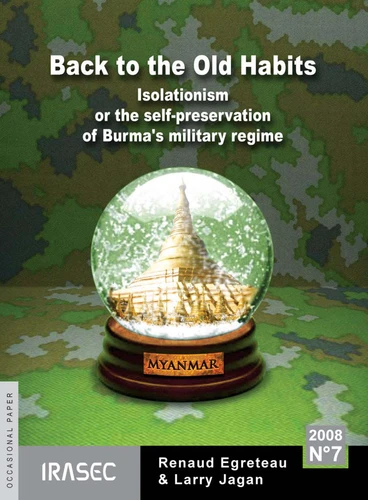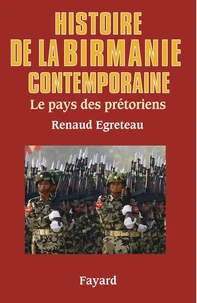Back to Old Habits. Isolationism or the Self-Preservation of Burma’s Military Regime
Par : ,Formats :
Disponible dans votre compte client Decitre ou Furet du Nord dès validation de votre commande. Le format Multi-format est :
- Pour les liseuses autres que Vivlio, vous devez utiliser le logiciel Adobe Digital Edition. Non compatible avec la lecture sur les liseuses Kindle, Remarkable et Sony
 , qui est-ce ?
, qui est-ce ?Notre partenaire de plateforme de lecture numérique où vous retrouverez l'ensemble de vos ebooks gratuitement
Pour en savoir plus sur nos ebooks, consultez notre aide en ligne ici
- Nombre de pages92
- FormatMulti-format
- ISBN978-2-9564470-6-1
- EAN9782956447061
- Date de parution03/07/2018
- Protection num.NC
- Infos supplémentairesMulti-format incluant PDF avec W...
- ÉditeurInstitut de recherche sur l’As
Résumé
This book argues that the Burmese military regime has always favoured an isolationist-type policy that finds its grassroots in Ne Win's autarchic and xenophobic era as well as in Burma's royal traditions, but without being completely cut off from the outside world. This policy approach is well suited to the Burmese authoritarian state which boasts an important strategic position in the region. In the past decade, the politics of "isolationism without isolation" has been skilfully developed by Burma's military elite in order to preserve itself from both internal and external threats.
Since the Depayin crackdown in May 2003, every step the Burmese junta has taken indicates that it has been consciously defining both its foreign policy and its internal political agenda according to these isolationist tendencies, as the recent fallbacks that followed the "Saffron Revolution" (September 2007) and the Cyclone Nargis (May 2008) illustrate. Not only does the military regime tend to strategically withdraw itself from the regional scene, by choosing only a few but crucial diplomatic and commercial partners like China, India, Singapore, Russia or Thailand, but it also gradually isolates itself from the rest of the Burmese society, by opting for a strategic and nationalist entrenchment which was perfectly highlighted by the purge of the pragmatic Military Intelligence Services (2004), the transfer of the capital to Naypyidaw (2005) and the strict control over the transitional process initiated by its own "Road Map towards a disciplined democracy" and undisrupted by the recent crises.
Since the Depayin crackdown in May 2003, every step the Burmese junta has taken indicates that it has been consciously defining both its foreign policy and its internal political agenda according to these isolationist tendencies, as the recent fallbacks that followed the "Saffron Revolution" (September 2007) and the Cyclone Nargis (May 2008) illustrate. Not only does the military regime tend to strategically withdraw itself from the regional scene, by choosing only a few but crucial diplomatic and commercial partners like China, India, Singapore, Russia or Thailand, but it also gradually isolates itself from the rest of the Burmese society, by opting for a strategic and nationalist entrenchment which was perfectly highlighted by the purge of the pragmatic Military Intelligence Services (2004), the transfer of the capital to Naypyidaw (2005) and the strict control over the transitional process initiated by its own "Road Map towards a disciplined democracy" and undisrupted by the recent crises.
This book argues that the Burmese military regime has always favoured an isolationist-type policy that finds its grassroots in Ne Win's autarchic and xenophobic era as well as in Burma's royal traditions, but without being completely cut off from the outside world. This policy approach is well suited to the Burmese authoritarian state which boasts an important strategic position in the region. In the past decade, the politics of "isolationism without isolation" has been skilfully developed by Burma's military elite in order to preserve itself from both internal and external threats.
Since the Depayin crackdown in May 2003, every step the Burmese junta has taken indicates that it has been consciously defining both its foreign policy and its internal political agenda according to these isolationist tendencies, as the recent fallbacks that followed the "Saffron Revolution" (September 2007) and the Cyclone Nargis (May 2008) illustrate. Not only does the military regime tend to strategically withdraw itself from the regional scene, by choosing only a few but crucial diplomatic and commercial partners like China, India, Singapore, Russia or Thailand, but it also gradually isolates itself from the rest of the Burmese society, by opting for a strategic and nationalist entrenchment which was perfectly highlighted by the purge of the pragmatic Military Intelligence Services (2004), the transfer of the capital to Naypyidaw (2005) and the strict control over the transitional process initiated by its own "Road Map towards a disciplined democracy" and undisrupted by the recent crises.
Since the Depayin crackdown in May 2003, every step the Burmese junta has taken indicates that it has been consciously defining both its foreign policy and its internal political agenda according to these isolationist tendencies, as the recent fallbacks that followed the "Saffron Revolution" (September 2007) and the Cyclone Nargis (May 2008) illustrate. Not only does the military regime tend to strategically withdraw itself from the regional scene, by choosing only a few but crucial diplomatic and commercial partners like China, India, Singapore, Russia or Thailand, but it also gradually isolates itself from the rest of the Burmese society, by opting for a strategic and nationalist entrenchment which was perfectly highlighted by the purge of the pragmatic Military Intelligence Services (2004), the transfer of the capital to Naypyidaw (2005) and the strict control over the transitional process initiated by its own "Road Map towards a disciplined democracy" and undisrupted by the recent crises.




